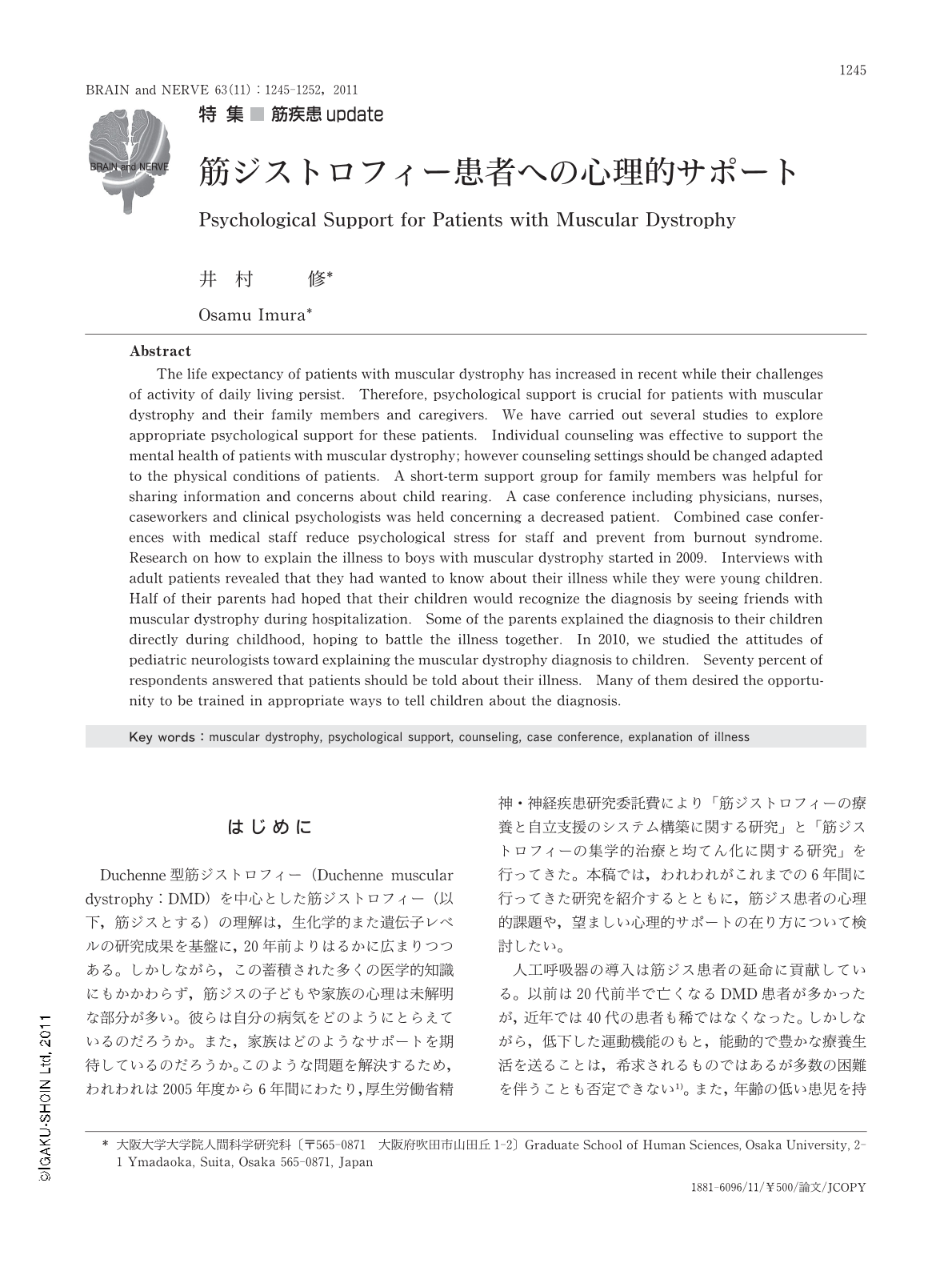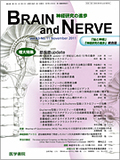Japanese
English
- 有料閲覧
- Abstract 文献概要
- 1ページ目 Look Inside
- 参考文献 Reference
はじめに
Duchenne型筋ジストロフィー(Duchenne muscular dystrophy:DMD)を中心とした筋ジストロフィー(以下,筋ジスとする)の理解は,生化学的また遺伝子レベルの研究成果を基盤に,20年前よりはるかに広まりつつある。しかしながら,この蓄積された多くの医学的知識にもかかわらず,筋ジスの子どもや家族の心理は未解明な部分が多い。彼らは自分の病気をどのようにとらえているのだろうか。また,家族はどのようなサポートを期待しているのだろうか。このような問題を解決するため,われわれは2005年度から6年間にわたり,厚生労働省精神・神経疾患研究委託費により「筋ジストロフィーの療養と自立支援のシステム構築に関する研究」と「筋ジストロフィーの集学的治療と均てん化に関する研究」を行ってきた。本稿では,われわれがこれまでの6年間に行ってきた研究を紹介するとともに,筋ジス患者の心理的課題や,望ましい心理的サポートの在り方について検討したい。
人工呼吸器の導入は筋ジス患者の延命に貢献している。以前は20代前半で亡くなるDMD患者が多かったが,近年では40代の患者も稀ではなくなった。しかしながら,低下した運動機能のもと,能動的で豊かな療養生活を送ることは,希求されるものではあるが多数の困難を伴うことも否定できない1)。また,年齢の低い患児を持つ親においても,日常生活での介護や,通学・通院などにかかわる負担が大きく,抑うつや社会的孤立を引き起こす可能性があると指摘されている2-4)。さらに,患児の年齢が上がるにつれ,患児自身も引きこもりや抑うつ傾向が強くなること,孤立しがちになったりすることも報告されている5)。
筋ジス患者が豊かで生きがいのある療養生活を送るためには,良質の医療サービスの提供とともに,心理的健康を維持・促進するようなサポートが望まれる。それに加え,患者を取り巻く家族や医療者のメンタルヘルスにも配慮が必要であろう。そこでわれわれの研究グループでは,患者・家族・医療スタッフに対する多面的な心理的サポートの問題を検討することにした。
Abstract
The life expectancy of patients with muscular dystrophy has increased in recent while their challenges of activity of daily living persist. Therefore,psychological support is crucial for patients with muscular dystrophy and their family members and caregivers. We have carried out several studies to explore appropriate psychological support for these patients. Individual counseling was effective to support the mental health of patients with muscular dystrophy; however counseling settings should be changed adapted to the physical conditions of patients. A short-term support group for family members was helpful for sharing information and concerns about child rearing. A case conference including physicians,nurses,caseworkers and clinical psychologists was held concerning a decreased patient. Combined case conferences with medical staff reduce psychological stress for staff and prevent from burnout syndrome. Research on how to explain the illness to boys with muscular dystrophy started in 2009. Interviews with adult patients revealed that they had wanted to know about their illness while they were young children. Half of their parents had hoped that their children would recognize the diagnosis by seeing friends with muscular dystrophy during hospitalization. Some of the parents explained the diagnosis to their children directly during childhood,hoping to battle the illness together. In 2010,we studied the attitudes of pediatric neurologists toward explaining the muscular dystrophy diagnosis to children. Seventy percent of respondents answered that patients should be told about their illness. Many of them desired the opportunity to be trained in appropriate ways to tell children about the diagnosis.

Copyright © 2011, Igaku-Shoin Ltd. All rights reserved.


